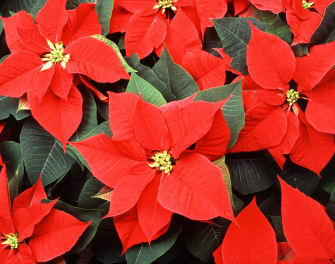Bright and colorful, poinsettias are nearly synonymous with the Christmas season. The familiar red leaves have been joined by even flashier colors and provide a wealth of opportunities for holiday decorating.
Poinsettias do require some care and maintenance throughout the holiday season. However, with a little bit of care these beauties of the season should remain in bloom for many weeks thus brightening your home for the holidays.

Poinsettia care begins with proper light, water, and temperature conditions.
Sunlight: Poinsettias prefer bright light. Bright, Indirect Sunlight is best as too much direct sunlight may cause the bracts or blooms to fade. If located by a window, be sure than none of the stems or leaves are in contact with the window pane itself as cold temperatures can damage the leaves. Poinsettias that are in direct sunlight may require more frequent watering.
Temperature: Poinsettias prefer a warm to semi-cool location (55-65 degrees minimum). Poinsettias do not tolerate warm or cool drafts so keep them away from radiators/ heating vents as well as away from doors/windows that are frequently opened and closed.
Watering: Poinsettias should be thoroughly watered using room temperature water. Water the plant until the water begins to run out of the drainage holes in the bottom of the pot; drainage is a MUST. Be sure not to allow any excess water to sit in saucers or pot covers as root-rot may occur.
Fertilizing: Fertilizer is NOT recommended during the holiday season or while the plant is in bloom. Fertilizing is only required if you decide to keep your poinsettia after the holiday season.
The Bottom Line on Poinsettias Being Poisonous:
For years, poinsettias have had the bad reputation being of poisonous. While they are certainly not meant to be eaten by humans or pets; ingesting poinsettias may cause some stomach upset, as would eating most any houseplant. However, poinsettias have been extensively tested and there is no evidence that they are toxic, poisonous, or unsafe to have in your home.
A more likely problem to watch for is a mild skin irritation from the milky white sap that is exposed when stems are broken. Many people are sensitive to this sap which can cause a mild itchy rash.
The bottom line is that they are beautiful, they are safe, and they say Christmas!
